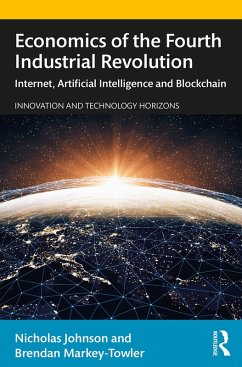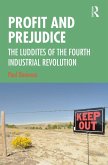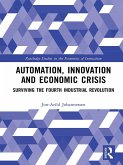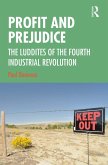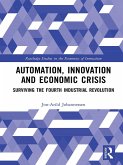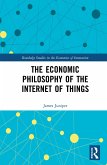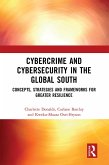Nicholas Johnson, Brendan Markey-Towler
Economics of the Fourth Industrial Revolution (eBook, PDF)
Internet, Artificial Intelligence and Blockchain
39,95 €
39,95 €
inkl. MwSt.
Sofort per Download lieferbar

20 °P sammeln
39,95 €
Als Download kaufen

39,95 €
inkl. MwSt.
Sofort per Download lieferbar

20 °P sammeln
Jetzt verschenken
Alle Infos zum eBook verschenken
39,95 €
inkl. MwSt.
Sofort per Download lieferbar
Alle Infos zum eBook verschenken

20 °P sammeln
Nicholas Johnson, Brendan Markey-Towler
Economics of the Fourth Industrial Revolution (eBook, PDF)
Internet, Artificial Intelligence and Blockchain
- Format: PDF
- Merkliste
- Auf die Merkliste
- Bewerten Bewerten
- Teilen
- Produkt teilen
- Produkterinnerung
- Produkterinnerung

Bitte loggen Sie sich zunächst in Ihr Kundenkonto ein oder registrieren Sie sich bei
bücher.de, um das eBook-Abo tolino select nutzen zu können.
Hier können Sie sich einloggen
Hier können Sie sich einloggen
Sie sind bereits eingeloggt. Klicken Sie auf 2. tolino select Abo, um fortzufahren.

Bitte loggen Sie sich zunächst in Ihr Kundenkonto ein oder registrieren Sie sich bei bücher.de, um das eBook-Abo tolino select nutzen zu können.
This book applies cutting-edge economic analysis and social science to unpack the complexities and paradoxes of the Fourth Industrial Revolution. The book takes the reader on a refreshing, and informative tour through its technological drivers, its profound impact on human ecosystems, and its potential for sustainable human development.
- Geräte: PC
- ohne Kopierschutz
- eBook Hilfe
- Größe: 2.28MB
Andere Kunden interessierten sich auch für
![Profit and Prejudice (eBook, PDF) Profit and Prejudice (eBook, PDF)]() Paul DonovanProfit and Prejudice (eBook, PDF)30,95 €
Paul DonovanProfit and Prejudice (eBook, PDF)30,95 €![Economics of the Fourth Industrial Revolution (eBook, ePUB) Economics of the Fourth Industrial Revolution (eBook, ePUB)]() Nicholas JohnsonEconomics of the Fourth Industrial Revolution (eBook, ePUB)39,95 €
Nicholas JohnsonEconomics of the Fourth Industrial Revolution (eBook, ePUB)39,95 €![Automation, Innovation and Economic Crisis (eBook, PDF) Automation, Innovation and Economic Crisis (eBook, PDF)]() Jon-Arild JohannessenAutomation, Innovation and Economic Crisis (eBook, PDF)44,95 €
Jon-Arild JohannessenAutomation, Innovation and Economic Crisis (eBook, PDF)44,95 €![Profit and Prejudice (eBook, ePUB) Profit and Prejudice (eBook, ePUB)]() Paul DonovanProfit and Prejudice (eBook, ePUB)30,95 €
Paul DonovanProfit and Prejudice (eBook, ePUB)30,95 €![Automation, Innovation and Economic Crisis (eBook, ePUB) Automation, Innovation and Economic Crisis (eBook, ePUB)]() Jon-Arild JohannessenAutomation, Innovation and Economic Crisis (eBook, ePUB)44,95 €
Jon-Arild JohannessenAutomation, Innovation and Economic Crisis (eBook, ePUB)44,95 €![The Economic Philosophy of the Internet of Things (eBook, PDF) The Economic Philosophy of the Internet of Things (eBook, PDF)]() James JuniperThe Economic Philosophy of the Internet of Things (eBook, PDF)44,95 €
James JuniperThe Economic Philosophy of the Internet of Things (eBook, PDF)44,95 €![Cybercrime and Cybersecurity in the Global South (eBook, PDF) Cybercrime and Cybersecurity in the Global South (eBook, PDF)]() Charlette DonaldsCybercrime and Cybersecurity in the Global South (eBook, PDF)47,95 €
Charlette DonaldsCybercrime and Cybersecurity in the Global South (eBook, PDF)47,95 €-
-
-
This book applies cutting-edge economic analysis and social science to unpack the complexities and paradoxes of the Fourth Industrial Revolution. The book takes the reader on a refreshing, and informative tour through its technological drivers, its profound impact on human ecosystems, and its potential for sustainable human development.
Dieser Download kann aus rechtlichen Gründen nur mit Rechnungsadresse in A, B, BG, CY, CZ, D, DK, EW, E, FIN, F, GR, HR, H, IRL, I, LT, L, LR, M, NL, PL, P, R, S, SLO, SK ausgeliefert werden.
Produktdetails
- Produktdetails
- Verlag: Taylor & Francis eBooks
- Seitenzahl: 212
- Erscheinungstermin: 25. Oktober 2020
- Englisch
- ISBN-13: 9780429771705
- Artikelnr.: 60143799
- Verlag: Taylor & Francis eBooks
- Seitenzahl: 212
- Erscheinungstermin: 25. Oktober 2020
- Englisch
- ISBN-13: 9780429771705
- Artikelnr.: 60143799
- Herstellerkennzeichnung Die Herstellerinformationen sind derzeit nicht verfügbar.
Nicholas Johnson is an economist and mathematician. He is the Principal Economist at Economists Without Borders. He also holds research and teaching positions at the University of Queensland and Queensland University of Technology. He holds a Master of Public Policy from the Australian National University, and undergraduate degrees in mathematics and economics (with First Class Honours) from Queensland University of Technology. Nicholas is a World Economic Forum Global Shaper.
Brendan Markey-Towler is a behavioural, institutional, evolutionary economist and an Associate with Economists Without Borders. He was previously a Senior Advisor at Evidn, a global behavioural science company headquartered in Brisbane, Australia. He has researched and taught at the University of Queensland, RMIT University, and University College London and holds a PhD in behavioural, institutional, and evolutionary economics and Bachelor of Economics with First Class Honours and a University Medal from the University of Queensland.
Brendan Markey-Towler is a behavioural, institutional, evolutionary economist and an Associate with Economists Without Borders. He was previously a Senior Advisor at Evidn, a global behavioural science company headquartered in Brisbane, Australia. He has researched and taught at the University of Queensland, RMIT University, and University College London and holds a PhD in behavioural, institutional, and evolutionary economics and Bachelor of Economics with First Class Honours and a University Medal from the University of Queensland.
1. Introduction: how and why to understand the Fourth Industrial
Revolution; Part I: Industrial revolutions: what they are, why they matter,
how to analyse them; 2. Industrial revolutions past, present and future: a
brief overview of how we got here and where we're going; 3. The telos of
industrial revolutions: how what people value drives the adoption of new
technologies; 4. The "Brisbane Club" model: mind, society, economy as
complex evolving networks; Part II: Internet: hyper-competition,
hyper-growth and the struggle for attention in global markets; 5. Global
markets and the struggle for attention: communication and platforms in the
rapidly-evolving internet age; 6. The ocean in your pocket: case studies in
global markets and the struggle for attention; Part III: Artificial
Intelligence: radical automation and expansion of human capability; 7. The
I Robot future: human work in an age of artificial intelligence; 8. The
ghost and the machine: case studies in the I Robot future; Part IV:
Blockchain: decentralising power, authority and the design of systems of
governance; 9. The entrepreneurship of rules: institutions in an age of
blockchain; 10. Leaderless revolutions: case studies in the
entrepreneurship of rules; Part V: Discussion and conclusions: harnessing
the Fourth Industrial Revolution in systems building; 11. The new economy:
opportunities, challenges, and what to do about them; 12. Epilogue: a call
to engage with a brave new world, and to have contingency plans
Revolution; Part I: Industrial revolutions: what they are, why they matter,
how to analyse them; 2. Industrial revolutions past, present and future: a
brief overview of how we got here and where we're going; 3. The telos of
industrial revolutions: how what people value drives the adoption of new
technologies; 4. The "Brisbane Club" model: mind, society, economy as
complex evolving networks; Part II: Internet: hyper-competition,
hyper-growth and the struggle for attention in global markets; 5. Global
markets and the struggle for attention: communication and platforms in the
rapidly-evolving internet age; 6. The ocean in your pocket: case studies in
global markets and the struggle for attention; Part III: Artificial
Intelligence: radical automation and expansion of human capability; 7. The
I Robot future: human work in an age of artificial intelligence; 8. The
ghost and the machine: case studies in the I Robot future; Part IV:
Blockchain: decentralising power, authority and the design of systems of
governance; 9. The entrepreneurship of rules: institutions in an age of
blockchain; 10. Leaderless revolutions: case studies in the
entrepreneurship of rules; Part V: Discussion and conclusions: harnessing
the Fourth Industrial Revolution in systems building; 11. The new economy:
opportunities, challenges, and what to do about them; 12. Epilogue: a call
to engage with a brave new world, and to have contingency plans
1. Introduction: how and why to understand the Fourth Industrial
Revolution; Part I: Industrial revolutions: what they are, why they matter,
how to analyse them; 2. Industrial revolutions past, present and future: a
brief overview of how we got here and where we're going; 3. The telos of
industrial revolutions: how what people value drives the adoption of new
technologies; 4. The "Brisbane Club" model: mind, society, economy as
complex evolving networks; Part II: Internet: hyper-competition,
hyper-growth and the struggle for attention in global markets; 5. Global
markets and the struggle for attention: communication and platforms in the
rapidly-evolving internet age; 6. The ocean in your pocket: case studies in
global markets and the struggle for attention; Part III: Artificial
Intelligence: radical automation and expansion of human capability; 7. The
I Robot future: human work in an age of artificial intelligence; 8. The
ghost and the machine: case studies in the I Robot future; Part IV:
Blockchain: decentralising power, authority and the design of systems of
governance; 9. The entrepreneurship of rules: institutions in an age of
blockchain; 10. Leaderless revolutions: case studies in the
entrepreneurship of rules; Part V: Discussion and conclusions: harnessing
the Fourth Industrial Revolution in systems building; 11. The new economy:
opportunities, challenges, and what to do about them; 12. Epilogue: a call
to engage with a brave new world, and to have contingency plans
Revolution; Part I: Industrial revolutions: what they are, why they matter,
how to analyse them; 2. Industrial revolutions past, present and future: a
brief overview of how we got here and where we're going; 3. The telos of
industrial revolutions: how what people value drives the adoption of new
technologies; 4. The "Brisbane Club" model: mind, society, economy as
complex evolving networks; Part II: Internet: hyper-competition,
hyper-growth and the struggle for attention in global markets; 5. Global
markets and the struggle for attention: communication and platforms in the
rapidly-evolving internet age; 6. The ocean in your pocket: case studies in
global markets and the struggle for attention; Part III: Artificial
Intelligence: radical automation and expansion of human capability; 7. The
I Robot future: human work in an age of artificial intelligence; 8. The
ghost and the machine: case studies in the I Robot future; Part IV:
Blockchain: decentralising power, authority and the design of systems of
governance; 9. The entrepreneurship of rules: institutions in an age of
blockchain; 10. Leaderless revolutions: case studies in the
entrepreneurship of rules; Part V: Discussion and conclusions: harnessing
the Fourth Industrial Revolution in systems building; 11. The new economy:
opportunities, challenges, and what to do about them; 12. Epilogue: a call
to engage with a brave new world, and to have contingency plans
